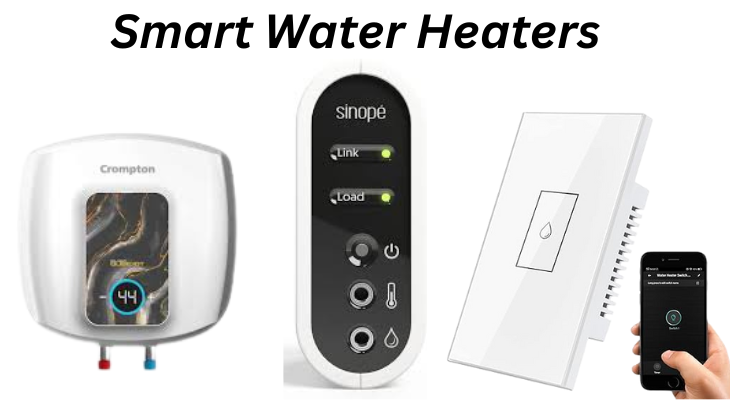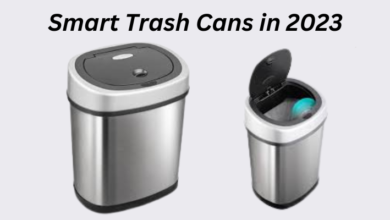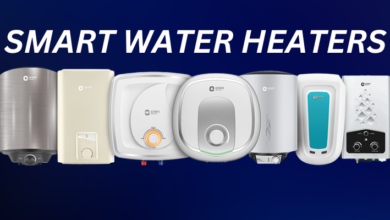The Power of Smart Water Heaters:Brainwave in the Basement

We now have more efficient smart water heaters in addition to standard hot water heaters, all thanks to 21st-century technology. Approximately 18% of the energy used in your home is accounted for by your water heater, which is a crucial component of your house. It generates hot water while putting energy efficiency first. Every time you required hot water, you would have to manually heat the water in the absence of a water heater.
Table of Contents
ToggleHow Does It Work?
Smart water heaters differ from traditional ones in their brains and brawn.
1.Sensing:
- Temperature Sensors: Embedded in the tank and pipes, these constantly monitor water temperature and flow.
- Leak Detectors: Some models have sensors to detect water leaks within the unit or nearby, preventing costly damage.
- Smart Metering: Advanced models might track your hot water usage patterns to predict future needs.
2.Processing:
- Smart Controller: This acts as the brain, analyzing sensor data and making decisions based on your settings or schedules.
- Connectivity: Usually Wi-Fi or Bluetooth, this allows communication with your smartphone app and smart home ecosystem.
3.Action:
- Heating Element: Gas burners or electric heating elements adjust their activity based on temperature and demand.
- Circulation Pump (Tankless models): Activates when hot water is needed, pushing water through the heating element on demand.
- Smart Valves (Advanced models): Can automatically shut off water supply in case of leaks or schedule changes.
4.User Interaction:
- Smartphone App: This is your command center, letting you set schedules, adjust temperature, monitor energy usage, and receive alerts.
- Voice Control (Compatible models): Some water heaters can be controlled with voice commands through smart assistants like Alexa or Google Assistant.
Here are some additional ways smart water heaters optimize performance:
- Predictive Heating: Learn your hot water usage patterns and preheat water just before you typically need it, reducing wasteful standby heating.
- Boost Mode: Temporarily increase water temperature for immediate needs, like filling a bathtub.
- Vacation Mode: Maintains a minimum temperature to prevent freezing while you’re away, saving energy.
Popular Brands and Models:
When choosing a smart water heater, brand and model are crucial considerations. Here are some popular options to explore:
Nest Learning Thermostat:
- Brand: Nest (owned by Google)
- Model: Nest Learning Thermostat with 3rd Gen Heat Link
- Features: Integrates with your existing Nest system, learns your hot water usage, offers eco-friendly scheduling, and provides detailed energy reports.
- Pros: Seamless integration, learning capabilities, energy efficiency.
- Cons: Requires existing Nest system, higher price point.
Ecobee Smart Water Heater:
- Brand: Ecobee
- Model: Ecobee Smart Water Heater
- Features: Works with Apple HomeKit, Alexa, and Google Assistant, offers leak detection and freeze protection, and includes a vacation mode.
- Pros: Broad smart home compatibility, leak protection, user-friendly app.
- Cons: Limited model availability, may not be the most energy-efficient.
Rheem EcoNet:
- Brand: Rheem
- Model: Rheem Performance Platinum 50-Gallon Electric Water Heater with EcoNet
- Features: Wi-Fi enabled, app control with scheduling and temperature adjustment, leak detection, and vacation mode.
- Pros: Affordable option, reliable brand, basic smart features.
- Cons: Limited smart functionalities compared to high-end models, not compatible with all smart home systems.
Bradford White IntelliTherm:
- Brand: Bradford White
- Model: Bradford White IntelliTherm M50T Plus Tankless Water Heater
- Features: High efficiency, on-demand water heating, Wi-Fi control with scheduling and diagnostics, and compatibility with various smart home systems.
- Pros: Energy-efficient, tankless design, comprehensive smart features.
- Cons: Higher price point, installation may require additional plumbing work.
A.O. Smith Home by Emerson:
- Brand: A.O. Smith
- Model: A.O. Smith Signature Series Gas Water Heater with Home by Emerson
- Features: Wi-Fi connectivity, app control with scheduling and leak detection, compatibility with Alexa and Google Assistant.
- Pros: Reliable brand, basic smart features with leak detection, affordable option.
- Cons: Limited smart functionalities compared to high-end models, not as energy-efficient as some tankless options.
Navien LPE Series:
- Brand: Navien
- Model: Navien LPE-A Gas Condensing Tankless Water Heater
- Features: High efficiency, condensing technology, Wi-Fi enabled with app control and multi-zone capabilities.
- Pros: Top-notch energy efficiency, multi-zone control for larger homes, reliable brand.
- Cons: High price point, installation may require specialized expertise.
These are just a few examples, and the best choice for you will depend on your budget, hot water needs, smart home compatibility preferences, and desired features. Always research and compare features before making your decision.
Remember, beyond brand and model, consider:
- Tank vs. Tankless: Each has its advantages and drawbacks in terms of space, efficiency, and cost.
- Gas vs. Electric: Evaluate fuel availability and costs in your area.
- Warranty and Aftercare: Choose a brand with a reputable warranty and readily available support.
Benefits of Smart Water Heater
Smart water heaters are becoming increasingly popular due to their numerous benefits. Here are a few of the most notable advantages:
- Increased Convenience and Control:
- Remote control: You can manage your water heater from anywhere using your smartphone or tablet. This means you can preheat the water before you get home from work, or turn it off remotely if you forget. Remotely control Smart Water Heater from phone
- Scheduling: You can set schedules for your water heater to automatically turn on and off at specific times. This is a great way to save energy and ensure that you always have hot water when you need it.
- Voice control: Some smart water heaters can be controlled with voice commands through smart assistants like Alexa or Google Assistant. This makes it even easier to adjust the temperature or turn the water heater on and off.
- Energy Savings:
- Predictive heating: Smart water heaters can learn your hot water usage patterns and preheat water only when you typically need it. This can significantly reduce standby energy consumption.
- Leak detection: Some models have built-in leak detection systems that can alert you to potential problems before they cause major damage. This can save you money on repairs and water bills.
- Vacation mode: You can put your smart water heater in vacation mode when you’re away from home. This will keep the water from freezing but prevent unnecessary heating, saving you energy and money.
- Improved Safety and Peace of Mind:
- Leak detection: As mentioned earlier, some smart water heaters have leak detection systems that can alert you to potential problems.
- Temperature control: You can easily adjust the temperature of your water heater using your smartphone or tablet. This can help to prevent scalding accidents.
- Remote monitoring: You can monitor your water heater’s performance remotely. This can give you peace of mind knowing that everything is working properly.
- Additional Benefits:
- Enhanced comfort: With a smart water heater, you can always be sure to have hot water when you need it. This can make your showers and baths more enjoyable.
- Reduced water waste: Some smart water heaters have features that can help you reduce your water consumption.
- Environmental benefits: By using less energy and water, smart water heaters can help to reduce your environmental impact.
Overall, smart water heaters offer a wide range of benefits that can make your life easier, save you money, and give you peace of mind. If you’re considering upgrading your water heater, a smart model is definitely worth considering.
Advantages and Disadvantages of Smart Water Heaters:
Advantages:
Convenience and Control:
- Remote app control from anywhere.
- Scheduling hot water usage for maximum efficiency.
- Voice control compatibility for hands-free adjustments.
Energy Savings:
- Predictive heating reduces standby energy waste.
- Leak detection prevents costly repairs and water waste.
- Vacation mode minimizes unnecessary heating while you’re away.
Safety and Peace of Mind:
- Built-in leak detection systems for early warning.
- Adjustable temperature settings to prevent scalding.
- Remote monitoring ensures everything is functioning properly.
Additional Benefits:
- Enhanced comfort with consistent hot water availability.
- Reduced water waste through smart features.
- Environmental benefits via decreased energy and water consumption.
Disadvantages:
Higher Cost:
- Smart water heaters come at a premium compared to traditional models.
- Installation may require professional assistance and additional expenses.
Tech Dependence:
- App functionality relies on Wi-Fi connectivity and smartphone accessibility.
- Potential for technical glitches or compatibility issues.
Limited Features:
- Functionality varies by model, with some offering basic controls and others featuring advanced options.
- Not all models integrate with all smart home ecosystems.
Maintenance and Repairs:
- Smart features may require specific expertise for troubleshooting or repairs.
- Potential reliance on manufacturer support for software updates and technical issues.
Conclusion:
Smart water heaters offer a range of benefits, including convenience, energy savings, safety, and comfort. However, they also come with higher costs, potential technical complexities, and reliance on technology. Carefully evaluate your needs and budget, research different models and features, and consider the advantages and disadvantages before making a decision. If you prioritize convenience, energy efficiency, and smart home integration, a smart water heater might be a worthwhile investment.
FAQs about Smart Water Heaters:
How much do smart water heaters cost?
Smart water heaters typically cost more than traditional models, with prices ranging from around $500 for basic models to $2,000 or more for high-end options with advanced features.
Do smart water heaters save energy?
Yes, smart water heaters can offer significant energy savings through features like predictive heating, leak detection, and vacation mode. These features help reduce unnecessary heating and water waste, leading to lower energy bills.
Are smart water heaters easy to install?
Most smart water heaters require professional installation due to their additional wiring and connections. Some basic models might be suitable for DIY enthusiasts with prior plumbing experience, but it’s generally recommended to hire a qualified plumber.
Do I need a special app to control my smart water heater?
Most smart water heaters come with their own dedicated app for control and monitoring. Some models might also be compatible with broader smart home platforms like Google Home or Alexa, allowing for centralized control.
What happens if my internet goes out?
While you might lose remote control functionalities during an internet outage, the basic heating operation in most smart water heaters should continue uninterrupted. Some advanced features might become unavailable, but the fundamental hot water service shouldn’t be affected.
Do smart water heaters require more maintenance?
While routine maintenance like flushing the tank is still essential, the built-in diagnostics and monitoring features of smart water heaters can make it easier to identify potential issues early on. However, complex repairs or software updates might require specific expertise from the manufacturer.




One Comment